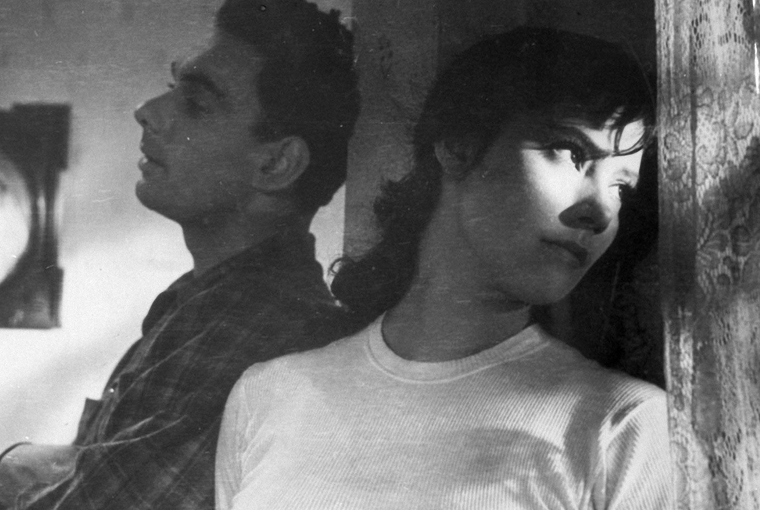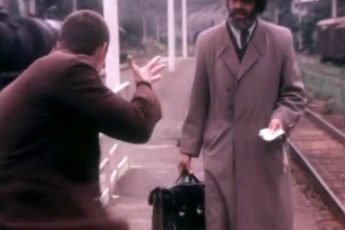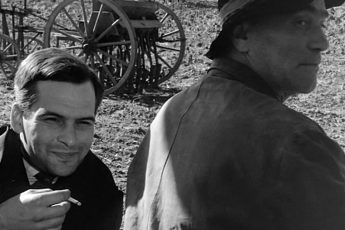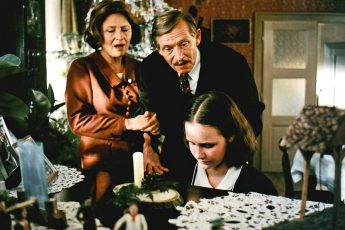The Thaw Before the Storm
Mikhail Kalatozov’s The Cranes Are Flying (Letyat zhuravli, 1957)
Vol. 6 (June 2011) by Stefania Marghitu
The Cranes Are Flying is tragic but not maudlin, epic yet not portentous. In 1958, the film won the Palme d’Or, and remains the only Russian film to have done so. Marked by the rare window in Soviet history known as The Thaw, propaganda towards The Patriotic War was eschewed and World War II was depicted from the individuals who suffered its travesties.
We are introduced to a young couple as beautiful and naive as Catherine Deneuve and Nino Castelnuovo in The Parapluies de Cherbourg. Veronika (Tatiana Samoilova, also known for her the titular role in Anna Karenina) and Boris (Aleksei Vladimirovich Batalov) spend much of the beginning of the film gazing longingly into each other’s eyes, as if they are the only two humans in the world. Following a full night out, Boris awakes in his family’s home to the sound of war sirens. We do not completely understand why he chooses to volunteer for the service, but Veronika is naturally devastated and disheartened by his cousin Mark’s quick advances in Boris’ absence.
Moscow is quickly obliterated by the War, and Veronika has yet to hear from her fiance. Air raids are so frequent that her parents no longer hide while she retreats to the underground. This air raid is more severe than anyone seemed to expect. In one of the most beautifully tragic scenes of the entire film, Veronika races up the stairs of her home to find nothing but a ledge overlooking her devastated city.
Boris’ family soon takes in Vernoika, and her once passionate expressions are now emotionless. Following another violent air raid, Mark confesses his love as she cries “No!” and slaps her unwanted suitor, as if the damsel in distress is taking her cues from Scarlett O’ Hara. Much to the dismay of Boris’ father, grandmother and previously posited as a curmudgeon sister, Veronika and Mark announce their engagement. The newly-formed family soon move outside of the city to work alongside a hospital for soldiers. We are never really told how or why Boris chooses to volunteer in the war and how Mark, a low-rate doctor, is relinquished from service. Mark proudly tells Veronika that only “the clever” can escape the war, but we soon understand that Boris’ act is a selfless one, and Mark is a coward.
Furthermore, when Veronika aids a wounded soldier who cries of his love that left him, Boris’ father implores the desperate hero to see that his former lover is spineless for not waiting for him while he sacrifices everything in the trenches. As in many a war love story, the soldier is enlisted and pines for his sweetheart, while she fears for the future and thinks of her own personal urgency.
The film’s cinematographer Sergei Urusevsky worked during the war as a cameraman alongside soldiers in the trenches. This first marked the invention and use of handheld cameras which would forever change the world of cinema. Writers, directors and cinematographers could communicate with stylized, personal close-ups that audiences never witnessed before. The shots of Veronika and Boris in the introduction are absolutely stunning, and for its time, completely revolutionary. Close-ups of our heroin show us her every emotion. It should also be noted that director Mikhail Kalatozov is also behind the equally devastating and beautiful Soy Cuba of 1964.
The technological advances and new ideas formed during The Thaw can attribute to the film’s attention to representing an individual in all his or her flaws and idiosyncrasies, rather than promoting a grandiose ideology. It is a film about the salvages of war, primarily from the point of view of the young Veronika, who waits for a sign of life from her fiancé turned solider, Boris until all hope is lost. The film is prescient to the French New Wave of the early 1960s: handheld cameras, Hollywood influence and a mission to show the truth behind France’s political and personal history encompassing the before and after of World War II. And much like the intentions of the Romanian films of the past decade, the filmmakers’ intentions were to represent an accurate portrayal of life during a significant historical period in reaction to the denial, propaganda and falsities.
In the closing scenes of The Cranes Are Flying, Veronika returns to Moscow amidst the soldiers’ mass return, only to finally come to terms with Boris’ death. A closing speech is given that articulates the film’s desired representation of the war: articulating that war is not to be celebrated, but that one must understand the suffering a mother and father, brother and sister, wife and lover, during a prolonged absence and period of uncertainty.
Fifty- four years later, this film still tells us a lot about the relationship between Western and Eastern Europe. Was this film successful due to its universal storytelling of a heartbroken fiance who hopelessly awaits her soldier, and to its technological innovations that enhanced the tragic intimacy of the war tale? Some critics speculate that this was the first time Soviets were humanized in the face of the West.
It was an attempt to portray the war from the eyes of those who suffered in every corner of the nation, and to underline a coming-of-age tale when one must come to terms with their personal sacrifices and tragedies in the face of a nation in a state of constant chaos and panic.




Leave a Comment